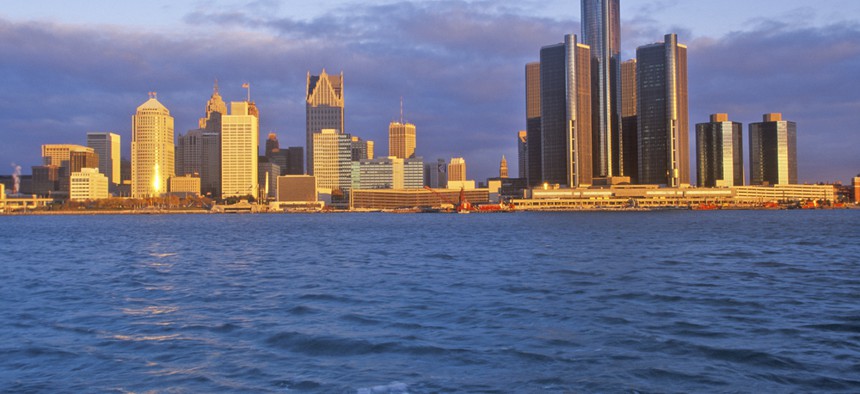Video: Implementing Smart City Policies Amid Dismal Fiscal Conditions

Detroit, Michigan, as seen from Windsor, Ontario. American Spirit / Shutterstock.com
Watch local-level leaders discuss how innovation can bloom despite daunting financial challenges.
There may be no better city in the nation to examine how innovation can take root under bad fiscal conditions than in Detroit.
Despite all the dismal headlines about the city’s finances, Detroit is a good place to study how the philanthropic and corporate community stepped up during difficult times and helped city leaders implement big reforms not because they wanted to but because they had no options to do otherwise.
Although the Meeting of the Minds 2014 conference took place in Detroit a few weeks ago, the San Francisco-based global knowledge-sharing group has been busy uploading videos of many of its panel discussions and speaker events.
One panel discussion, titled “Government Without Governance: Funding + Implementing Smart City Policies Amid Fiscal Constraint,” brought together four panelists: Jennifer Bradley, a fellow and senior advisor at the Brookings Institution’s Metropolitan Policy Program; Wendy Lewis Jackson, deputy director of the Kresge Foundation; Garlin Gilchrist II, deputy chief information officer for technology and engagement in the Detroit mayor’s office; and Jessica Robinson, market launch manager of carsharing company Zipcar.
With Detroit on the path out of its historic bankruptcy, cross-sector collaboration and new ways to foster philanthropy, innovation and adaptation have been necessary elements for Detroit to build toward brighter days.
“There’s been such a convergence of sectors here in Detroit and philanthropy is just one of many that have put in place a number of key building blocks to help the city and accelerate its transformation,” Jackson said in the video, adding that the city is poised to take its “moonshot” and is “changing everything at once ... the scale is breathtaking.”
Garlin Gilchrest II, deputy chief information officer for technology and community engagement in the office of Detroit Mayor Mike Duggan, said that he’s committed to making Detroit “a more connected city” and wants to unlock more and more of Detroit’s stored data that the private sector, academic researchers and non-profit partners can make good use of for the betterment of the entire city:
There are troves of very valuable information that is pertinent to decision-makers in the private sector and that’s pertinent to researchers in the academic community and when that information is free and available and real and primary and current, people can then be collaborators with the city in terms of how we make decisions, in terms of how we design policies and in terms of how we create solutions that make living in Detroit better.
Although few other major U.S. cities face the same degree of challenges that Detroit faces, Bradley noted that local government leaders in other parts of the country find themselves in a similar situation and are having to find ways to confront their challenges head on:
City leaders were looking at the resources they had and saying: "We can do more than we had thought if we bring our resources together, if we stop looking at one sector, whether that’s government-only or business-only or philanthropy-only, to solve our problems and figure out how we can all come together." So you have this really amazing convergence of need when the federal government pulled back and opportunity when city leaders from all sectors realized: "OK, it’s going to be hard and it’s going to be really scary and we’ve never done this before but we think we can can step up and we think we can move our places forward because honestly, we have no other choices."
Watch the full video segment:






